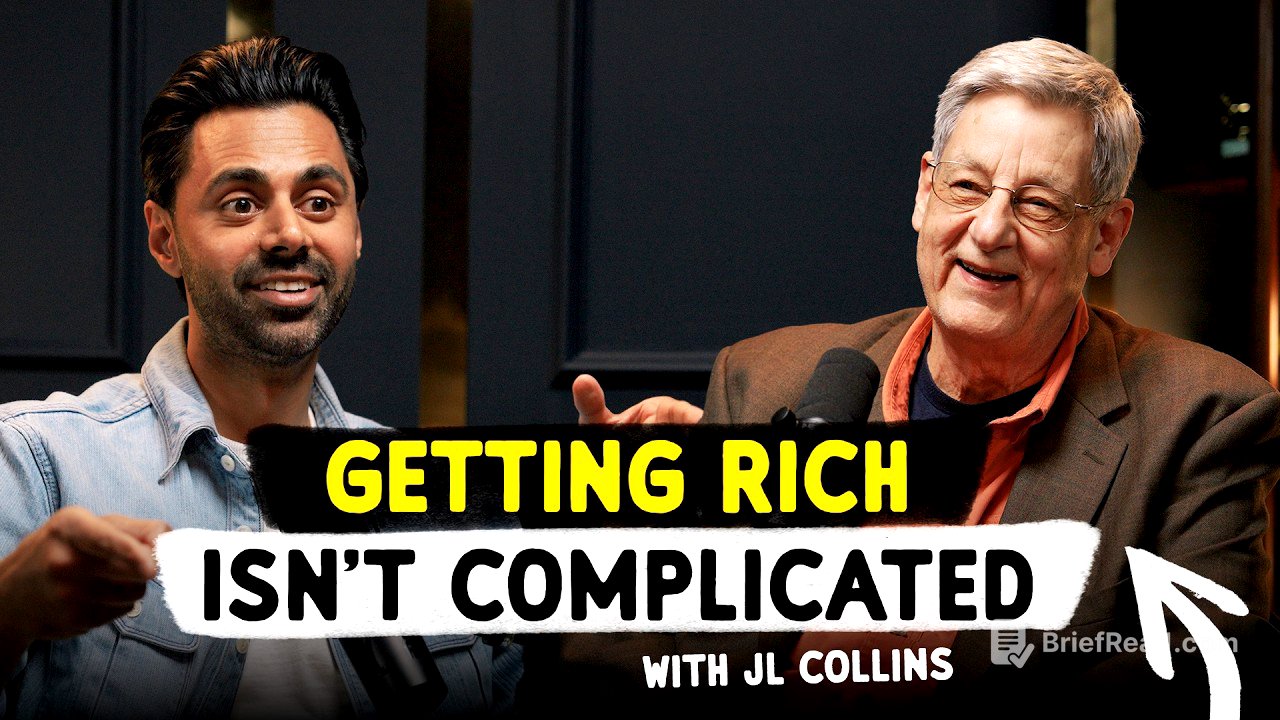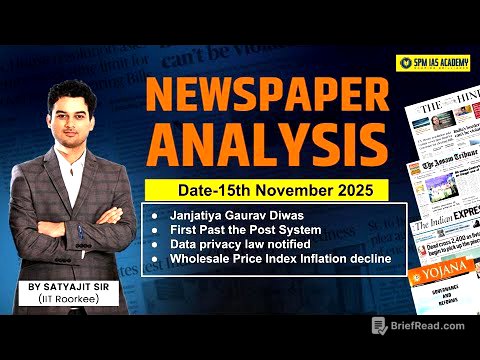TLDR;
Hasan Minhaj interviews JL Collins, author of "The Simple Path to Wealth," discussing basic principles of personal finance, investing, and achieving financial independence. They discuss strategies for building wealth, avoiding common financial pitfalls, and the importance of simple, long-term investment approaches.
- Spend less than you earn
- Invest the surplus in an index fund
- Avoid debt
Monologue [0:00]
Hasan Minhaj introduces JL Collins, the author of "The Simple Path to Wealth," as a counter to the financial grifters and scammers prevalent online. Minhaj emphasizes that Collins' advice, while simple and perhaps boring, is effective. Collins' financial philosophy revolves around three basic rules: spend less than you earn, invest the surplus in an index fund, and avoid debt.
JL Collins is everyone’s Dad [1:27]
Minhaj recounts his early struggles with money management as a comedian in Los Angeles, where he hoarded cash in shoeboxes. He credits a roommate for introducing him to financial concepts like 401ks and Roth IRAs, which led him to Collins' book. Minhaj humorously frames Collins as a father figure dispensing financial advice, highlighting the reluctance people often have to discuss money. Collins explains that he wrote the book because he struggled to get his own daughter to listen to his financial advice.
Why are people so bad with money? [3:30]
Collins attributes people's struggles with money to the complexity Wall Street creates around financial products, making it seem impossibly complicated. He argues that the key to wealth is simplicity, a message not promoted by mainstream media or the internet, where complex and often misleading financial advice is rampant.
Why isn’t JL Collins a grifter? [4:23]
Minhaj questions why Collins isn't a "grifter" selling courses and sub-books to get rich, Collins credits his mother for instilling a conscience in him. Minhaj references Collins' 2018 Google talk where he advised against investing heavily in Google stock, illustrating Collins' genuine sincerity. Collins explains that he advises against holding a large portion of wealth in any single company because all companies, even successful ones like Google, have a life cycle and will eventually fade. He uses Sears as an example of a once-dominant company that declined.
Living within your means [9:35]
Collins outlines the three core principles of his "Simple Path to Wealth": avoid debt, live on less than you earn, and invest the surplus. Minhaj challenges the idea of being "cheap," Collins clarifies that it's about prioritizing financial freedom over material possessions. He uses the analogy of choosing between a Chevy and a Cadillac, where the former provides adequate transportation while leaving more money for investments. Minhaj raises the scenario of someone making $46,000 a year and wanting to enjoy life, questioning the need to save for the future. Collins acknowledges that most people prioritize current spending, but he emphasizes the importance of knowing there's another option.
F*ck You Money vs. Financial Independence [16:42]
Collins defines financial independence as having enough money to cover all living expenses with a cushion. "FU money" is the financial cushion acquired over time that allows one to make bolder life choices, such as quitting a job. Collins stresses that financial independence is not a set number but varies for everyone based on their lifestyle. He shares stories from his book "Pathfinders," which features individuals from diverse backgrounds who have achieved financial independence, including a migrant fruit picker who became worth half a million dollars.
Is leasing a car bad? [22:59]
Collins advises against leasing a car, calling it not financially optimal unless one is already wealthy. He shares his personal approach of buying cars outright and avoiding car payments. He recounts his father's strategy of saving up for a car by making payments to himself, emphasizing the importance of buying a cheap, reliable car initially to start the cycle.
What is VTSAX? [27:02]
Collins recommends investing in VTSAX, Vanguard's total stock market index fund, which represents ownership in every publicly traded company in the United States. He explains that this broad-based, low-cost investment is all one needs, dismissing the complex financial products promoted by Wall Street. Collins highlights the research indicating that active management (paying someone to pick stocks) typically doesn't work long term, with index funds often outperforming active managers.
Going all in on NVDA [34:26]
Minhaj challenges Collins' advocacy for VTSAX by pointing out the higher returns of investing in specific tech companies like Nvidia over the past decade. Collins responds that those were lucky bets in hindsight, not predictable outcomes. He uses the analogy of betting on a horse race, where one might win big with a long shot but can't reliably predict the winner. Collins reiterates that VTSAX will reliably make one wealthy over time.
Investing in the tech sector [38:11]
Minhaj questions why not focus investments on the tech sector, given its current dominance. Collins explains that VTSAX is cap-weighted, meaning it's already heavily loaded with successful tech companies. He notes that the top sectors rotate over time, and VTSAX's "self-cleansing" process ensures it always holds the leaders of the pack.
Bitcoin is a speculation [41:05]
Minhaj brings up Bitcoin, noting its high year-over-year returns and questioning why not allocate capital to it. Collins firmly states that Bitcoin is a speculation, not an investment. He explains that it's too volatile to be a currency and relies on someone in the future paying more for it. Collins contrasts this with investing in companies that actively create wealth by producing goods and services.
Is the S&P 500 a bubble? [46:14]
Minhaj references articles suggesting the S&P 500 could be in a bubble and crash. Collins responds that crashes are a normal part of the process and should be expected. He recounts three major market crashes he's experienced and advises using them as opportunities to acquire shares at bargain prices. Collins acknowledges the fear of the present moment but emphasizes that the market has historically recovered from various crises.
Why your house is a terrible investment [53:49]
Collins explains that a house is not an investment but a lifestyle choice. He details the enormous expenses associated with homeownership, including mortgage, taxes, maintenance, and repairs. Collins advises separating the concept of a house from an investment, recommending that people own assets like VTSAX instead.
The Monk and the Minister [56:50]
Minhaj closes the conversation with the parable of the monk and the minister, illustrating the spectrum of financial priorities. The monk values simplicity and freedom from catering to others, while the minister is rich but dependent on the king. Collins concludes that there is more life satisfaction in being closer to the monk than the minister.







![[#벌거벗은세계사] 세계 경제를 흔든 미국의 고관세 정책💵 트럼프가 고관세에 집착하는 이유 '매킨리 관세법'은 무엇인가❓](https://wm-img.halpindev.com/p-briefread_c-10_b-10/urlb/aHR0cDovL2ltZy55b3V0dWJlLmNvbS92aS90NVh5TUJhQ0pfYy9ocWRlZmF1bHQuanBn.jpg)

